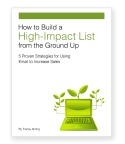3 Simple Steps to Generating More Leads from Your B2B Website
I’ve spoken with business owners in the past who don’t quite see the point of investing much effort in their online presence.
After all, with so many millions of sites online now, what’s the point?
But ask any average B2B buyer, and you’ll probably hear an entirely different story.
I’ve said it before and I’ll say it again: Your website is the hub of your marketing strategy.
It’s the initial contact point for many of your prospects and can be anything from a lead generation powerhouse to a relationship killer.
And so much of what you get out of it is dependent on three very simple ingredients: keywords, information, and pricing.
Keywords
This is one of the absolute basics of effective search engine optimization (SEO), but it’s also seriously lacking on a surprising number of B2B websites.
If your business is one of the many guilty of throwing a few hastily constructed pages together just so you can say yes, we have a web presence, I want you to picture this.
An as yet unknown prospect is working on an efficiency overhaul at one of their main warehouses and they’re actively seeking out providers of energy management software.
And as one of the estimated 80% to 90% of B2B buyers, they’re busily researching potential suppliers online before making their first contact with anyone’s sales department.
Now, if your site isn’t targeting the keywords they’re searching for, chances are they’ll never even know you exist—which would make your website about as effective as a snoozing security guard.
But by using just a few tools, from free to fee-based, you can identify the keywords your prospects are using and weave them strategically into your pages.
So the next time potential customers start searching for something you sell, they’ll be much more likely to find you instead of your competitors.
Information
In an increasingly competitive market where buyers become more and more savvy with each passing year—each wanting their most immediate questions answered now—information pages are one of the most efficient ways to give them what they want.
In fact, I’ve written about the importance of information pages to your B2B website in the past.
Available for view 24 hours a day, potential buyers the world over can find out any time they want exactly what your product or service has to offer them.
And because the average B2B buyer is hungry for education, websites that don’t offer pages designed to answer their most common questions will lose visitors—quickly.
Information pages also work hand in hand with targeted keywords to create more opportunities for your web pages to rank high in your prospective customers’ online searches.
Pricing
How many B2B websites have you visited lately that offer pricing information? Not many, I’d wager.
Which is surprising, when you think about it.
After all, can you imagine visiting a B2C website that didn’t contain pricing information? I mean, picture Amazon without prices. It’s unthinkable.
But when B2B buyers were asked in a survey by MarketingSherpa to give the number one piece of missing information on the average B2B website, what do you think the overwhelming response was?
Pricing.
This means that contrary to the average B2B marketer’s assumption that pricing is one of the final pieces of information needed in the sales cycle, it’s actually one of the very first.
Even if a prospect is nowhere close to being ready to buy, they still want to know early on in the cycle how much your product or service costs.
And since this is something most B2B websites don’t offer, if you start offering this information, you could be filling a tremendous gap and having a positive influence on scores of potential buyers.
The best websites are like the best companies—they’re about finding out what works and what doesn’t and evolving to meet the changing needs of their clientele.
Yes, there are many ways to go about building the “perfect” website (if there could ever be such a thing), but they don’t have to be the most expensive ways.
Sometimes the simplest tactics really are the best.
Return to articles




